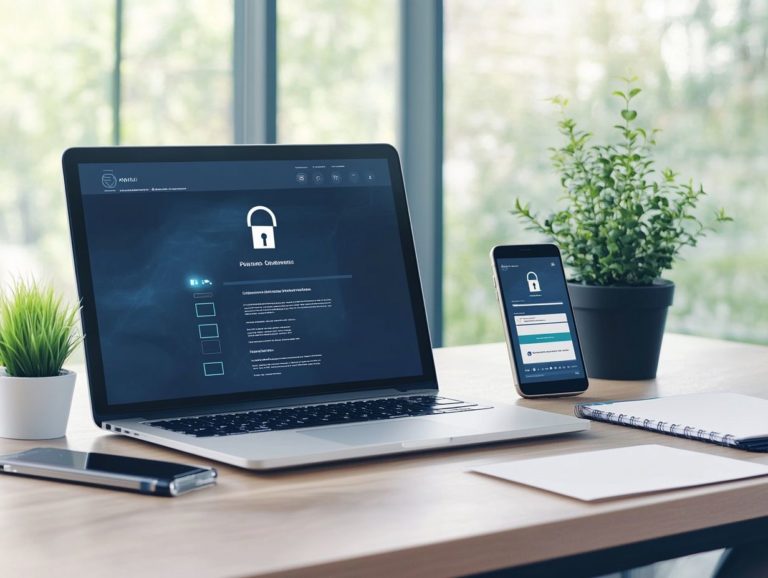how to stay compliant with hipaa regulations
Navigating the complex world of healthcare regulations can feel overwhelming, particularly when it comes to HIPAA compliance. Grasping the nuances of HIPAA and its vital function in protecting patient information is crucial for healthcare providers, businesses, and employees alike.
This article delves into the significance of compliance, outlining the potential repercussions of failing to adhere to these regulations. You ll discover the essential rules and requirements mandated by HIPAA, along with actionable steps to ensure your organization maintains compliance.
It also highlights common pitfalls to avoid. Equip yourself and your organization to effectively safeguard sensitive health information.
Contents
- Key Takeaways:
- Why Compliance is Important
- Understanding HIPAA Rules and Requirements
- Steps to Stay Compliant with HIPAA Regulations
- Common Pitfalls to Avoid
- Frequently Asked Questions
- What happens if I don’t comply with HIPAA?
- What are some key elements to consider for HIPAA compliance?
- How can I ensure my organization is HIPAA compliant?
- Are there any specific steps to follow to stay compliant with HIPAA regulations?
- What are some common mistakes organizations make when trying to stay compliant with HIPAA regulations?
- What resources are available to help organizations stay compliant with HIPAA regulations?
Key Takeaways:

- Stay compliant with HIPAA regulations to avoid potential consequences of non-compliance.
- Understand the different rules and requirements of HIPAA, including the Privacy, Security, Breach Notification, and Enforcement Rules.
- Regularly train and educate employees, conduct risk assessments, and implement appropriate safeguards.
What is HIPAA?
The Health Insurance Portability and Accountability Act (HIPAA) is a federal law established in 1996 under President Bill Clinton, crafted to safeguard sensitive patient data. It mandates that healthcare providers, health insurance plans, and healthcare clearinghouses uphold the confidentiality and security of protected health information, commonly referred to as PHI.
This legislation lays down guidelines for managing personal health information, including its electronic transmission. It enforces critical standards for privacy and data security within the healthcare sector.
The purpose of HIPAA transcends mere compliance; it cultivates a culture of trust between you and your healthcare providers. This encourages you to seek necessary medical care without the anxiety that your personal information might be mishandled.
Regulations like the Privacy Rule dictate how your information can be used and disclosed. Meanwhile, the Security Rule focuses on protecting electronic PHI. Healthcare organizations must therefore invest in robust systems and training that prioritize your confidentiality.
As a result, these requirements not only shield individuals like you but also bolster the integrity and credibility of the healthcare landscape as a whole.
Why Compliance is Important
Compliance with HIPAA regulations is essential for healthcare organizations. It not only protects patient privacy but also acts as a barrier against data breaches, which can result in severe legal and financial repercussions.
These consequences may include hefty fines and a significant loss of trust from both patients and partners. Prioritizing HIPAA compliance is not just a legal obligation; it s a commitment to safeguarding the integrity of your organization and the well-being of those you serve.
Potential Consequences of Non-Compliance
Non-compliance with HIPAA regulations can lead to serious ramifications for healthcare organizations. These can include hefty fines, legal troubles, and damage to reputation stemming from data breaches that compromise patient privacy.
Take, for example, a significant case involving a major healthcare provider that faced a staggering $5 million penalty due to a breach affecting thousands of patients’ medical records. Other violations have included improper disposal of patient information; one hospital was fined for failing to securely shred documents containing sensitive data.
These cases highlight various penalties that can be enforced, from civil and criminal fines to the imposition of mandatory compliance training. Organizations must act now to protect patient confidentiality!
The fallout from non-compliance can drastically undermine trust and erode the very foundation of patient-provider relationships.
Understanding HIPAA Rules and Requirements
Grasping the intricacies of HIPAA rules and requirements is crucial for healthcare providers looking to maintain compliance and safeguard patient data effectively. You ll encounter several key regulations:
- The Privacy Rule, which protects personal health information (PHI);
- The Security Rule, which establishes standards for data security;
- The Breach Notification Rule, mandating the reporting of data breaches;
- The Enforcement Rule, detailing penalties for any violations.
Understanding these guidelines will empower you to navigate the complexities of patient data protection with confidence.
Now is the time to assess your organization’s compliance status and seek training to ensure you’re fully protected.
Learn How HIPAA Protects Your Health Information!

The Privacy Rule under HIPAA sets forth national standards designed to protect your protected health information (PHI), which is any information about a person’s health status, healthcare, or payment for healthcare that can identify them. This ensures that your confidentiality is upheld and grants you rights over your personal health data.
This regulation gives you the power to access your medical records, allowing you to make informed decisions regarding your healthcare. For instance, when you request a copy of your records, healthcare providers are required to respond promptly. This demonstrates transparency and respect for your autonomy.
The rule also explains who can access your information, ensuring that it is shared only with those who have a legitimate need, such as other healthcare professionals involved in your care.
Following these principles protects your privacy and builds trust in the healthcare system, exemplified by practices that regularly train staff to uphold robust data protection measures.
Security Rule
The Security Rule complements the Privacy Rule by outlining the essential safeguards needed to uphold the confidentiality, integrity, and availability of electronic protected health information (ePHI). You are required to implement technical, physical, and administrative safeguards to defend against cybersecurity threats.
By employing effective risk assessment methods, you can identify potential vulnerabilities within your systems. This means regularly updating firewalls, encryption techniques, and access controls to keep your data secure.
Establishing robust administrative safeguards, such as staff training and incident response planning, is crucial for fostering a culture of compliance. Adopting best practices also highlights the importance of ongoing monitoring and auditing to promptly identify and mitigate risks.
This not only ensures compliance with the Security Rule but also helps maintain trust with your patients through diligent data protection measures.
Breach Notification Rule
The Breach Notification Rule requires healthcare organizations to promptly inform affected individuals and the Department of Health and Human Services when a data breach involving protected health information occurs. This keeps patients informed and holds organizations accountable for their data protection efforts.
Timely reporting isn t just a legal obligation; it s essential for minimizing potential harm to patients and restoring trust in the healthcare system. Ideally, you should notify affected parties within 60 days of discovering a breach, as outlined by federal guidelines. It is crucial to act fast in case of a breach; every second counts!
Compliance audits are vital in this landscape; they help you identify weaknesses that could lead to breaches. Take the 2017 Anthem breach, for instance, where the personal data of nearly 79 million individuals was compromised this serves as a stark reminder of the consequences of inadequate security measures.
Conducting such audits allows organizations to address vulnerabilities before they can be exploited.
Enforcement Rule
The Enforcement Rule lays out the essential procedures for investigating and enforcing HIPAA violations, clearly outlining the penalties and fines that healthcare organizations can face if they fail to adhere to the regulations.
These procedures are pivotal in prioritizing patient privacy, encompassing thorough investigations that may be initiated by complaints or compliance reviews. If a healthcare entity is found in violation of HIPAA, it could encounter a spectrum of penalties, ranging from fines in the thousands to millions of dollars, depending on the severity and nature of the breach.
Several factors can influence these penalties, including the organization s compliance history, the degree of negligence involved, and whether individuals or groups were harmed due to the violation. For example, a prominent case involved a hospital that incurred a staggering $3 million fine after exposing thousands of patient records online, highlighting the severe repercussions that can arise from insufficient data protection measures.
Steps to Stay Compliant with HIPAA Regulations
To ensure compliance with HIPAA regulations, healthcare organizations must adopt a systematic approach.
This includes conducting regular risk assessments, implementing comprehensive employee training programs, and deploying appropriate safeguards to effectively protect patient data.
Employee Training and Education

Implementing detailed training programs for your employees is essential as a healthcare provider. This ensures that every staff member understands HIPAA regulations and their critical role in protecting patient data.
Your programs should cover a wide range of topics, from basic privacy laws to more complex issues like data breach protocols. Frequent training sessions ideally quarterly or biannually will reinforce these concepts and keep your team updated on changes in regulations or best practices.
Effective training also uses assessment tools, such as quizzes and scenario-based discussions, to gauge employee understanding. For example, a leading hospital recently launched an interactive e-learning module that captivated participants and resulted in fewer compliance violations.
This demonstrates how a well-structured training initiative can enhance understanding and adherence to crucial regulations.
Regular Risk Assessments
Regular risk assessments are vital for healthcare organizations to identify vulnerabilities in systems and processes. This practice ensures compliance with HIPAA regulations and strengthens data protection against cybersecurity threats.
Ongoing evaluations help you quickly identify issues and adopt standardized methodologies like qualitative and quantitative assessments. Typically performed semi-annually or annually, these assessments should be flexible to adapt to regulation changes or technology advancements.
Each evaluation round requires thorough documentation of findings, essential for ongoing training and refining safeguards. This way, you can maintain compliance with evolving standards like NIST (National Institute of Standards and Technology) and significantly enhance your cybersecurity posture, effectively protecting patient information.
Implementing Appropriate Safeguards
Implementing appropriate safeguards is crucial for HIPAA compliance. This includes a mix of technical safeguards like encryption, administrative safeguards such as access control policies, and physical safeguards to protect facilities housing sensitive patient data.
These measures are vital for ensuring the confidentiality, integrity, and availability of sensitive health information. For instance, technical safeguards like encryption protect patient data during electronic transmission, keeping it unreadable to unauthorized users.
On the administrative side, strict access control policies ensure that only authorized personnel can access sensitive information, minimizing the risk of breaches. Physical safeguards may involve securing data centers with locks and surveillance systems to prevent unauthorized entry.
Together, these safeguards foster a trustworthy environment for patient data, highlighting the importance of a comprehensive compliance approach.
Common Pitfalls to Avoid
Healthcare organizations must be vigilant in recognizing and avoiding common pitfalls that can lead to HIPAA non-compliance. These pitfalls include:
- Insufficient employee training
- Neglecting to conduct regular risk assessments
- Failing to maintain proper documentation of compliance efforts
Actively addressing these issues will protect your organization and strengthen patient trust.
Mistakes that can Lead to Non-Compliance
Common mistakes that can lead to HIPAA non-compliance may catch you off guard think poor documentation practices, inadequate risk assessments, and insufficient training on handling patient data. These oversights can result in serious violations and significant penalties.
For example, if a healthcare organization fails to log access to patient records properly, tracing unauthorized access or breaches becomes challenging. Such lapses can lead to hefty fines and loss of patient trust, severely tarnishing a facility’s reputation.
To mitigate these risks, it s essential for organizations to implement regular training sessions that emphasize data security and HIPAA requirements. Conducting thorough audits to assess risk management practices will help identify vulnerabilities early, allowing for prompt corrective action to ensure compliance.
The Importance of Maintaining HIPAA Compliance

Maintaining HIPAA compliance is crucial for healthcare organizations. It protects patient privacy, secures sensitive data, and builds trust with patients and stakeholders!
Following compliance standards greatly reduces legal risks. It also enhances patient satisfaction.
A study showed that 75% of patients prefer providers who are transparent about how they handle data. Moreover, strict compliance can lower operational costs by avoiding fines and legal fees.
This approach reassures patients about their safety and fosters an environment that promotes better health outcomes, ultimately benefiting the entire healthcare ecosystem.
Frequently Asked Questions
What happens if I don’t comply with HIPAA?
Failing to comply can lead to heavy fines and legal trouble. It damages your reputation and erodes patient trust!
What are some key elements to consider for HIPAA compliance?
Key elements include conducting regular risk assessments and implementing appropriate security measures.
Also, training employees on HIPAA regulations and maintaining proper documentation is essential.
How can I ensure my organization is HIPAA compliant?
Regularly review and update policies and procedures. Conduct training for employees and audit compliance regularly.
Also, conduct risk assessments frequently to stay ahead.
Are there any specific steps to follow to stay compliant with HIPAA regulations?
Yes! Essential steps include having a designated HIPAA compliance officer, conducting regular risk assessments, implementing appropriate technical safeguards, and having signed Business Associate Agreements (contracts that outline how third-party vendors will handle your patient data) with any third-party vendors.
What are some common mistakes organizations make when trying to stay compliant with HIPAA regulations?
Common mistakes include not providing proper employee training and failing to implement appropriate technical safeguards.
Additionally, organizations often do not review and update their policies and procedures regularly.
What resources are available to help organizations stay compliant with HIPAA regulations?
Various resources exist, including official HIPAA compliance websites, online training courses, consulting services, and software tools designed specifically for HIPAA compliance.
It is essential to choose resources that best fit your organization’s needs and budget.






